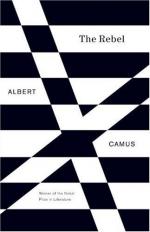
|
| Name: _________________________ | Period: ___________________ |
This test consists of 15 multiple choice questions and 5 short answer questions.
Multiple Choice Questions
1. According to Part 3, Bakunin believed what is the incarnation of crime?
(a) The Nazis.
(b) The State.
(c) The Priests.
(d) The Government.
2. According to Stirner in Part 2, what leads to the justification of crime?
(a) Revolution.
(b) Rebellion.
(c) Love.
(d) Power.
3. In the Introduction, what does Camus say criminals use as an alibi?
(a) Premeditation.
(b) Passion.
(c) Logic.
(d) Philosophy.
4. Who, according to Part 3, pushed nihilism to the "farthest coherent point"?
(a) Nechaiev.
(b) Hitler.
(c) Nietzsche.
(d) Bakunin.
5. In Part 2, Camus explains Nietzsche recognized himself as the "most acute manifestation" of what?
(a) Rebellion's reasoning.
(b) Atheism's beliefs.
(c) Christianity's values.
(d) Nihilism's conscience.
6. Who do the first mythologies describe as an "eternal martyr"?
(a) Zeus.
(b) Eschylus.
(c) Satan.
(d) Prometheus.
7. In Camus' introduction, what does he say "remains an exception"?
(a) Murder.
(b) Passion.
(c) Philosophy.
(d) Love.
8. According to Part 2, what is the only religion that is present throughout history?
(a) Belief in government.
(b) Belief in philosophy.
(c) Belief in eternity.
(d) Belief in love.
9. According to Part 1, remaining silent gives the appearance that one has no what?
(a) Feelings.
(b) Tongue.
(c) Opinions.
(d) Thoughts.
10. Who wrote Society of the Friends of Crime?
(a) Voltaire.
(b) Sade.
(c) Camus.
(d) Marx.
11. In the introduction, what is it always possible to do?
(a) To commit crime.
(b) To delegate murder.
(c) To act reasonably.
(d) To act illogically.
12. With Nietzsche in Part 2, what is no longer a revenge?
(a) Evil.
(b) Hatred.
(c) Satan.
(d) Power.
13. Nietzsche cannot separate what from lucidity?
(a) Moral conduct.
(b) Metaphysical rebellion.
(c) Real morality.
(d) Methodical doubt.
14. According to Camus' introduction, one purpose is to find out if what can avoid committing murder?
(a) Logic.
(b) Philosophy.
(c) Love.
(d) Innocence.
15. According to Part 3, Saint-Just is a contemporary of whom?
(a) Nietzsche.
(b) Hitler.
(c) Sade.
(d) Voltaire.
Short Answer Questions
1. Nietzscheism as defined by Camus in Part 2 is the theory of the individual's will to what?
2. According to Part 3, nihilists believed in nothing but what?
3. What does Part 3 focus on?
4. According to Part 3, what naturally establishes the Republic of law and order?
5. According to Part 3, destroying everything pledges oneself to build without what?
|
This section contains 340 words (approx. 2 pages at 300 words per page) |

|




